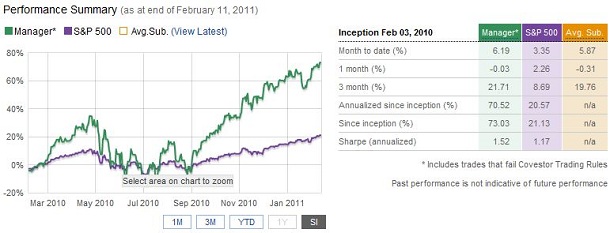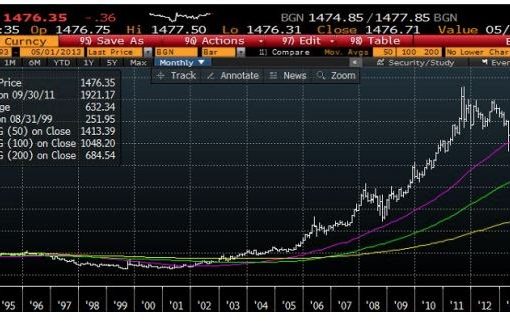Author: Mark Holder
Covestor model: Opportunistic Arbitrage
Disclosure: Long TMRK, ANR, MEE, PUDA, DKS, LNC, FWLT, ATW, LLNW, LIZ, GFA, SVNT, RIGL
January was another decent month for the market, but this model struggled to keep up. After months of strong gains, numerous stocks hit the wall. The model basically ended flat, although around mid-month the emerging market, commodity and biotech stocks struggled mightily. Fortunately, by month-end several stocks rebounded and combined with two buyouts helped narrow the relative performance gap for January.
Buyouts
Two of the major developments in the model during January were announcements of buyouts at the end of the month.
First, Verizon (VZ) announced the buyout of Terremark Worldwide (TMRK) on January 28 for $19, at a 35% premium from the January 27 close (Source: AP https://www.nytimes.com/2011/01/29/technology/29verizon.html). TMRK is a data center operator and premium cloud services provider. This deal was timely as the model was looking to reduce exposure to this stock that continues to grow by issuing debt. The buyout allowed the exit of the position at a great price much higher than expected.
Second, Alpha Natural Resources (ANR) agreed to buyout Massey Energy (MEE) in a deal long rumored by the market. The deal calls for ANR to pay MEE 1.025 shares plus $10 in cash for each MEE share. (Source: Press release http://alnr.client.shareholder.com/releasedetail.cfm?ReleaseID=546291) Considering the model owns both stocks and ANR fell on the news, the immediate benefits of the deal were limited. MEE, though, had participated via a significant run up over the last several months. Though the model had hoped for a buyout by a competitor, the deal creates a global metallurgical coal powerhouse only topped by two other partnerships. With the dip of ANR stock following the announcement, the stock remains extremely cheap considering the assets now held and the opportunities to reduce costs.
This model will look for opportunities to exit the combined ANR/MEE position to reduce exposure to the coal sector. Along with the position in Puda Coal (PUDA), the model has more coal exposure then desired. MEE has been a great investment after loading up following the explosion at the Upper Big Branch in April. The company has been an operational mess since then, but the bet was that the massive met coal reserves would prove to buoy the stock and fortunately it worked out as planned.
Trades
Trading in January was mostly limited to taking profits in a few large gainers. In addition to the big profits booked in TMRK, this model also sold about a third of its position in Dicks Sporting Goods (DKS) and the whole position in Freeport McMoRan (FCX).
DKS had become closer to fully priced, trading at a forward PE over 20 during January (Source: Yahoo Finance). With a growth rates estimated around 17%, DKS will likely not see any further multiple expansion limiting the upside to the growth rate. The company remains the leading sporting goods retailer and a top notch operator so the remaining position will be held for now.
FCX was sold to reduce commodity exposure as it appeared the rally in commodities like copper might be ending towards the end of January. Unfortunately the price of copper has since rebounded to new all time highs leaving FCX with plenty of room to run above its recent highs in the low $60s (split adjusted). This position might be re-added considering the bullishness of copper.
The only purchase was Lincoln National Corp (LNC). Insurance companies like LNC and model favorite Hartford Financial (HIG) continue to report reliable earnings while trading at extremely low valuations. Both companies trade at 60-70% of book values and PEs in the sub 8 range (Source: Yahoo Finance). The valuation was too cheap to pass up, adding more exposure.
Big Movers
The model had numerous big winners and losers last month.
Again due to the buyout, TMRK had a significant gain, exceeding 46% for the month. MEE was another big winner at over 17%. (Source: Yahoo Finance)
The other big winners are related to rising oil or technology. Atwood Oceanics (ATW) and Foster Wheeler (FWLT) will both gain as higher oil prices lead to more capital spending on projects to boost exploration and processing of oil. Limelight Networks (LLNW) mainly benefited from a rebound in the stock price after a significant drop in December.
Unfortunately several stocks stumbled this month. Liz Claiborne (LIZ) faced significant losses after pre-announcing weaker Q4 results – it was down 31% for the month. The company continues to struggle to turn around its prospects after a miserable couple of years. They continue to control several desirable brands and trade at valuations that might entice some bids. Competitor Jones Group (JNY) also reported weak numbers, giving credence to a bad sector as opposed to a bad stock.
Emerging market stock Gafisa (GFA) continued to struggle – down 14% in January – following a weak December as well. The Brazilian home builder was again crushed as high inflation led to higher interest rates. Housing needs will remain strong and the stock should rebound as interest rates hopefully stabilize.
The other weak sector was biotech. The model has three positions in the biotech sector, with two positions in small biotechs purposely held lower than average to control risk. Unfortunately both Savient Pharma (SVNT) and Rigel Pharma (RIGL) lost significant value during January – SVNT dropped 17% and RIGL was down 11% (Source: Yahoo Finance). The sector remains undervalued and under owned at this point. Expect the model to either add to these positions or initiate a new position as relative value appears strongest in this sector.
Conclusion
The market headed higher for another month, yet the underlying volatility of individual stocks was high. 2011 appears headed towards a strong stock market but after an extremely bullish five month period starting September 1st, I’m always on the lookout for taking profits and hedging gains. The market is bound to hit a rough patch this year, but the constant calls for a correction could be reducing the likelihood of any imminent collapse. Moreover, domestic funds are finally seeing strong inflows, providing ammunition for buyers that the market hasn’t seen in years.
The model began February with reduced but still high leverage, as good valuations are still abundant. Expect more of the same unless the market changes for the worse.



